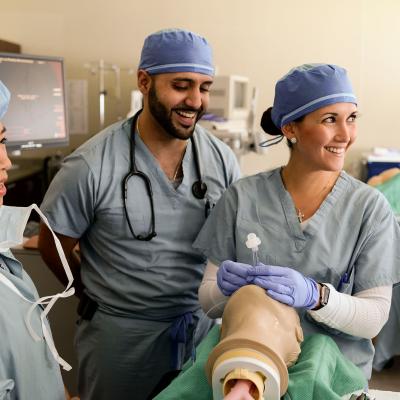- AdventHealth University

A career in nursing offers many opportunities to make a difference in people's lives. As you explore your options, you'll likely see two common paths: becoming a licensed practical nurse (LPN) or earning an Associate of Science in Nursing (ASN) to become a registered nurse (RN). Both offer unique advantages, and understanding the differences between our LPN and ASN programs is important for choosing what’s right for you.
Understanding the Career Paths: Licensed Practical Nurse vs. Registered Nurse
Before going over these educational paths, it’s important to understand what these programs prepare you for. LPNs provide basic nursing care under the supervision of an RN or physician. Their duties often include taking vitals, assisting with daily living activities and administering certain medications.
On the other hand, RNs have a broader scope of practice. They assess patients, develop care plans, administer medications and often supervise LPNs and other health care staff. An ASN degree prepares you to become an RN.
LPN: A Fast Track to Nursing
LPN programs offer a focused and relatively quick path to a nursing career. The curriculum covers essential nursing skills, including:
- Anatomy and physiology
- Basic patient care
- Medical-surgical nursing
- Pharmacology
These programs typically take 12 to 18 months to complete and are offered at vocational schools, community colleges and some hospitals.
Is Completing an LPN Program the Same as Having an Associate Degree?
Being an LPN is not the same as having an associate degree — LPNs earn a diploma or certificate. While LPN programs provide a solid foundation in nursing, they don't lead to an associate degree. However, this path allows you to enter the workforce sooner and gain valuable experience, which can be a stepping stone to further education.
ASN: Your Path to Becoming a Registered Nurse
ASN degrees are offered at community colleges and universities and are the fastest way to become an RN. These programs typically take two years to complete and provide a more comprehensive nursing education, preparing you for the NCLEX-RN exam, which is required for RN licensure. The curriculum covers:
- Anatomy and physiology
- Medical-surgical nursing
- Mental health nursing
- Microbiology
- Nursing fundamentals
- Pharmacology
ASN programs also offer greater clinical, hands-on experience with a deeper level of training in patient care.
Salary Expectations: ASN vs. LPN
We know that salary is a significant factor when considering your future career in nursing. Registered nurses with an associate degree in nursing typically earn more than licensed practical nurses because of their expanded scope of practice and responsibilities. While salaries can vary based on location, experience and employer, RNs generally have a higher earning potential.
Registered Nurse Salary
According to NurseJournal, the average salary for a registered nurse with an associate degree in nursing is about $77,000 a year.
Licensed Practical Nurse Salary
According to the Bureau of Labor Statistics (BLS), the average salary for a licensed practical nurse is about $60,000 a year.
Key Differences to Consider
Choosing between an LPN vs. ASN program depends on several factors, including your circumstances, career goals and learning style. Here's a breakdown of the key differences to consider:
| LPN | ASN | |
|---|---|---|
| Program Length | 12 to 18 months | 2 years |
| Educational Level | Diploma/Certificate | Associate degree |
| Career Role | Licensed Practical Nurse | Registered Nurse |
| Scope of Practice | Basic nursing care, under supervision | Comprehensive patient care, independent |
| Salary Expectations | Lower | Higher |
| Advancement | Limited, often requires further education | More opportunities, including management |
Which Path Is Right for You?
Pursuing an LPN program might be a good fit if you want to enter the workforce quickly and gain hands-on experience in basic patient care. However, if you want to complete a Bachelor of Science in Nursing (BSN) or have more independence and higher earnings, the best path is an ASN degree.
Start Your Nursing Career at AdventHealth University
At AdventHealth University (AHU), we're dedicated to helping you enter the nursing field with confidence. Our Associate of Science in Nursing (ASN) program prepares you for a rewarding career as an RN to continue our mission of Extending the Healing Ministry of Christ. Our program combines academic rigor with hands-on clinical experience, giving you the skills and knowledge you need to succeed and deliver whole-person care to our patients.
To learn more about our ASN program, you can request information from our Orlando or Tampa sites. We're here to answer your questions and guide you through the application process.
Apply now, and take your first step toward a fulfilling nursing career at AHU.


